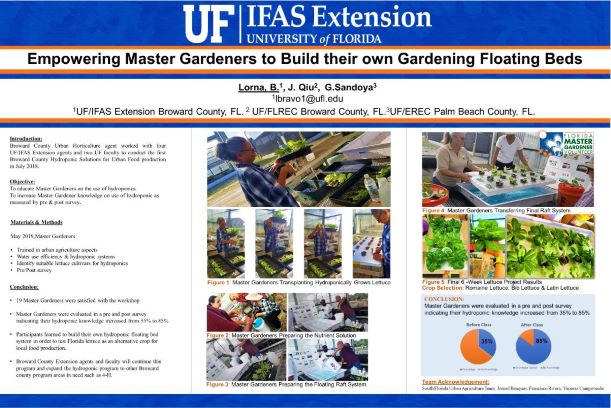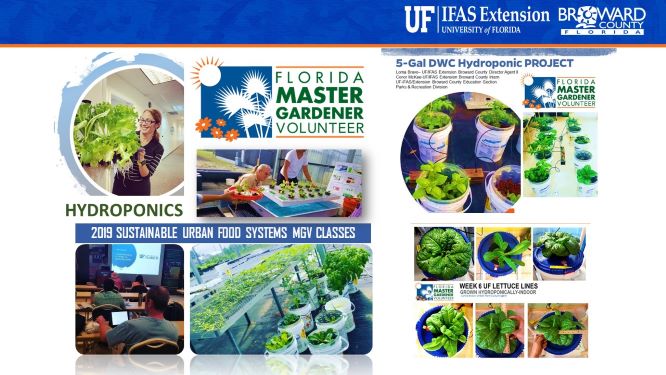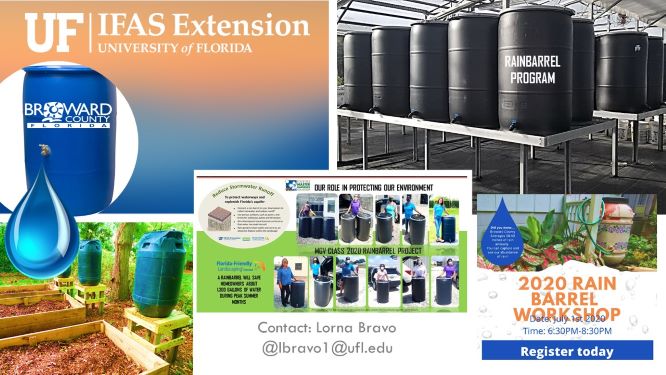
Sustainable Urban Food Production
Urban food production (also known as “urban agriculture”) is broadly defined as growing, processing, and distribution of food (e.g., crops, livestock, etc.) for the urban market both within and on the fringe of urban areas.
Click on the tabs below for more information on our Sustainable Urban Food Production programs and to learn more about how you can apply these methods in your own home.
- Southeast Regional Master Gardener Volunteer Virtual Conference 2020
-
Sustainable Urban Agriculture Wokshops
Why is sustainable urban food Prouction important?
Globally, more than half of the population is living in urban areas that rely upon external supplies of resources, such as food and clean water. It is projected that 2.5 billion more people will live on the planet by the mid-21st century, with disproportionate growth in urban populations. The state of Florida, as the third most populous state, has reached a population of more than 21 million in 2018, and is project to exceed 31 million in 2050. Challenges from increased urbanization and resource demands in cities are further exacerbated by shifting land use, and increasing impacts of climate change and economic fluctuations. It is thus vital to explore sustainability pathways that enhance resource efficiency in urban systems, reduce tradeoffs, and improve urban resilience. Urban food production, by promoting local food production, decentralizing food supply, and reducing food imports from highly industrialized production systems, is one of such pathways that could contribute to long-term urban sustainability.
What is sustainability?
The concept of sustainability is defined as the practice or development that meets the needs of the present without compromising the ability of future generations to meet their needs. Sustainability has three pillars or dimensions: environment, economics, and society, and thus achieving sustainability involves the balance of all these three goals simultaneously.
How does urban food production contribute to sustainability?
At the local scales, urban food production could achieve multifunctionality such as food security, water and nutrient reuse, stormwater management, ecosystem health, and social-economic benefits (e.g., household income supplements, providing employment, and diversifying industry base). At regional to global scales, urban food production could counteract indirect land-use changes and promote climate mitigations through reducing environmental externalities (e.g., reduced greenhouse emissions and energy use associated with food supply chains) related with food trade and imports.
Interested in urban food production in south Florida?
Incipient grass-root and business interests have advocated for different forms of urban food production (e.g., community garden, urban-adjacent farm, food forests, greenhouse production, vertical farming) across south Florida (see figure below on selected representative sites) for addressing food security issues, public health, elevated social inequality, and worsening environmental conditions. Developing local food production is of particular relevance for south Florida, where food security is now becoming a major concern with 326 identified “food deserts” where residents have difficulty in accessing affordable, fresh, and nutritious food.
What is the Sustainable Urban Food Production Short-course?
This comprehensive UF/IFAS Extension short course includes a series of lectures and hands-on workshops and field trips centered on sustainable urban food production. It is geared for anyone (e.g., community gardeners, urban farmers, homeowners, school teachers, entrepreneurs, general public) interests in increasing the knowledge and awareness and adopting best management practices related to urban food production, and enhancing the livelihoods of urban residents.
This short-course was delivered in 2019 and anticipated to continue annually. The course collaborates between Dr. Jiangxiao Qiu from UF Fort Lauderdale Research Center and UF/IFAS Extension agents (Lorna Bravo in Broward County, and Jessica Ryals in Collier County).
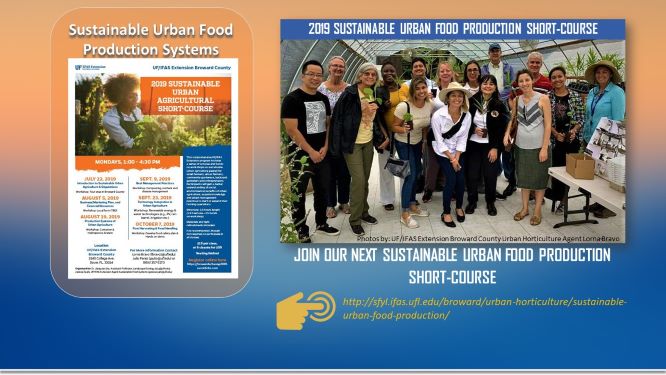
-
The Garden Project
The Garden
UF/IFAS Extension Broward County Master Gardener Volunteers began a 1/4 acre Master Gardener Volunteer Demonstration Vegetable Garden (“The Garden”) in May 2018. The team’s mission is to use “The Garden” as an educational outreach that demonstrates solutions to the unique growing condition of urban Broward County.
2019 Master Gardener Volunteer Legacy Grant Award Recipients
Did you know that In 2019, UF/IFAS Extension Broward County Master Gardener Program received the 2019 Master Gardener Legacy Grant award?
This award recognizes the importance of urban agriculture education, with an emphasis on educating Broward County teachers on implementing urban agriculture initiatives through UF/IFAS Extension’s Master Gardener Volunteer education program for community and school urban garden efforts. (Check out our blog article HERE for more informaiton on the award)
Introduction to The Garden Project
Sustainable Home Gardening Projects
-
UF/IFAS Extension Broward County-How to Grow Microgreens in 8 Days
- Video: How to Grow Microgreens in 8 Days
- Blog Article:
- Materials and Instruction Guide: How to Grow Microgreens: Pea Shoots
-
UF/IFAS Extension Broward County-Self-Watering Bucket Garden Project-Train the Trainer Project
- Video: Self Watering Bucket Garden Project
- Blog Article:
- Materials and Instruction Guide: Self- Watering Bucket Garden (PDF)
-
UF/IFAS Extension Broward County-How to Grow Food with Self-Watering Containers-Limited Space
- Video: How to Grow Food with Self-Watering Containers
- Blog Article:
- Materials and Instruction Guide: Self- Watering Urban Planter (PDF)
Train the Trainer Series
-
-
CRUNCH
What is the Florida CRUNCH?
The Florida CRUNCH is a one-day event organized by schools across the state to celbrate National Farm to School Month.
It raises awareness of Florida-grown produce and healthy eating by highlighting one fruit or vegetable for students to learn about and sample in a taste test.
The event encourages schools to serve more Florida-grown produce in the cafeteria throughout the year.
Farm to School
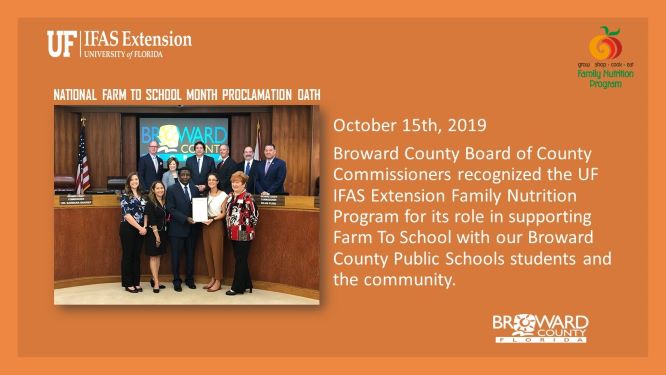
2020 Florida CRUNCH
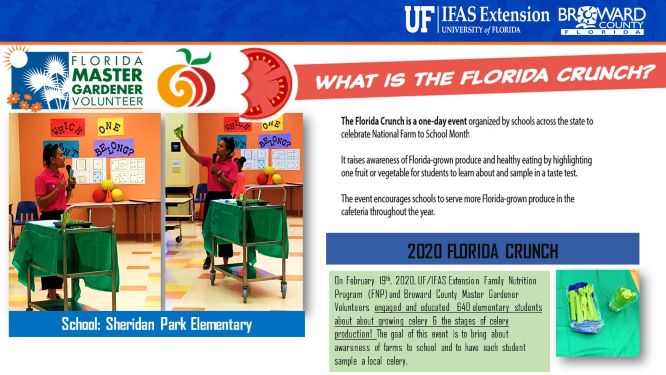
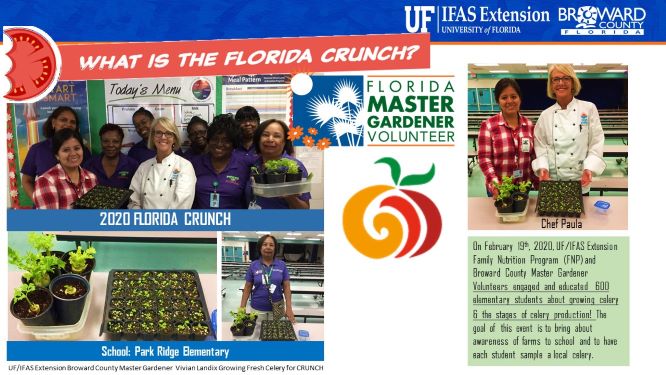
-
Hydroponics Systems
South Florida Hydroponic Initiative
- Video: South Florida Hydroponics Initiative
- Blog Article:
- Materials and Instruction Guide:
Broward County Master Gardener Volunteers Evaluate UF/IFAS Lettuce Lines Grown Hydroponically
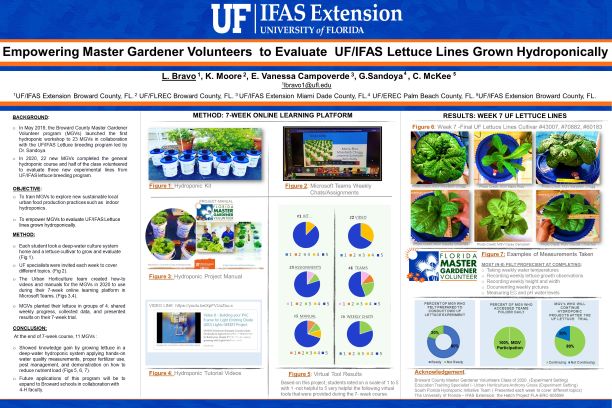
- Video:
- Blog Article:Broward County Master Gardener Volunteers Evaluate UF/IFAS Lettuce Lines Grown Hydroponically
- Materials and Instruction Guide:
-
Vermicomposting
Introduction to Vermicomposting
-
Why Vermicomposting?
- Video: Why Vermicomposting?
- Blog Article:
- Materials and Instruction Guide:
-
Building Your Worm Bin (Part 1)
- Video: Building your Worm Bin (Part 1)
- Blog Article:
- Materials and Instruction Guide:
-
Building Your Worm Bin (Part 2)
- Video: Building Your Worm Bin (Part 2)
- Blog Article:
- Materials and Instruction Guide:
-
Vermicomposting - Harvesting (Part 3)
- Video: Vermicomposting - Harvesting (Part 3)
- Blog Article:
- Materials and Instruction Guide:
-
-
Rain Barrel Program
Rainwater Harvesting
Did you know that South Florida is one of the wettest areas of the country? South Florida receives an average of 62 inches of rainfall per year. Most of this water washes off green lawns and pavements carrying fertilizers and other chemicals into local waterways. A rain barrel is an inexpensive way of capturing and storing some of this water for later use.
The Florida-Friendly Landscaping™ (FFL) program promotes several environmentally friendly landscaping practices intended to protect natural resources with proper maintenance and water-wise irrigation. The program helps residents conserve water by adopting and installing water-conservation practices and technologies in their home landscapes. Incorporating water harvested in a rain barrel with Florida-Friendly landscaping will help you enjoy your Florida landscape year-round. Check with your city Code Inspection and HOA to be sure rain barrels are allowed.
Rainwater Harvesting
- Video: Rainwater Harvesting
- Blog Article:FFL - Adopting Water Conservation Practices with Rain Barrels
- Materials and Instruction Guide:
Interested in Obtaining a Rain Barrel?
Contact Lorna Bravo at lbravo1@ufl.edu for more information.
Interested in Testing your Rain Barrel Water Quality?
Please, Contact Lorna Bravo, Lbravo1@ufl.edu for more information
Rain Barrel Water Testing Form
Interested in a Rain Barrel Workshop for your group?
Please, check back for updates on future Rain Barrel Workshops.
-
UF/IFAS Solutions for Your Life - Sustainable Home Food Production
Please visit the web page below to learn about UF/IFAS Solutions for Your Life State Initiatives regarding Sustainable Home Food Production:
-
Contact Us
For more information on any of our Sustainable Urban Food Production programs or for help with your own sustainable urban food production efforts, please contact:
- Lorna Bravo, County Extension Director and Urban Horticulture Agent II, UF/IFAS Extension, Broward County
954-756-8529 | lbravo1@ufl.edu
- Jiangxiao Qiu, Assistant Professor of Landscape Ecology and Ecosystem Service, University of Florida, Fort Luaderdale Research & Education Center
954-577-6337 | qiuj@ufl.edu
- Lorna Bravo, County Extension Director and Urban Horticulture Agent II, UF/IFAS Extension, Broward County
Contact Us
Lorna Bravo Urban Horticulture Agent II (954) 756-8529 lbravo1@ufl.edu
UF/IFAS Broward County Extension 3245 College Avenue Davie, FL 33314
(954) 756-8550
Urban Horticulture Menu
- Urban Horticulture and Natural Resources
- Hydroponic Solutions for Urban Food Production
- FFL Resources
- Broward County Bioblitz
- Publications
Helpful Links
Ask A Master Gardener
Landscape questions and photos can be emailed to: browardmg@ifas.ufl.edu
If you would like to talk to a Master Gardener please call: (954) 756-8533


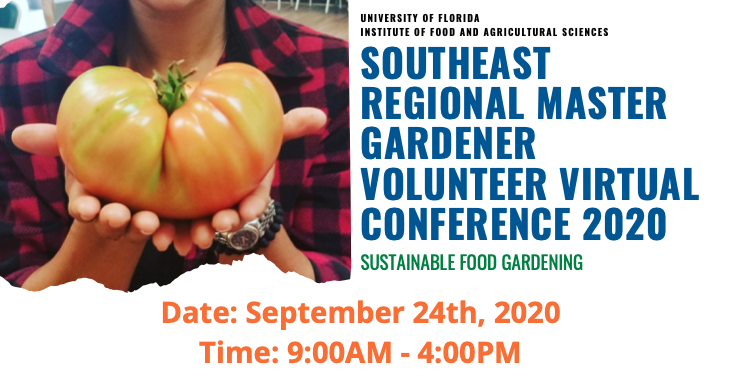

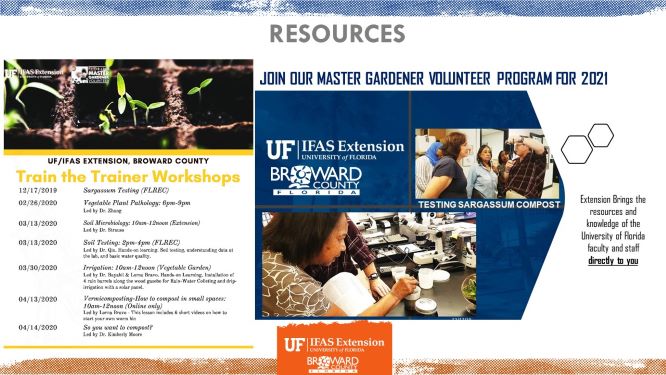
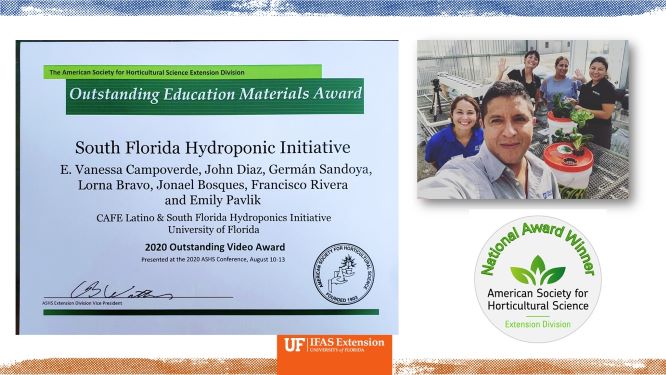
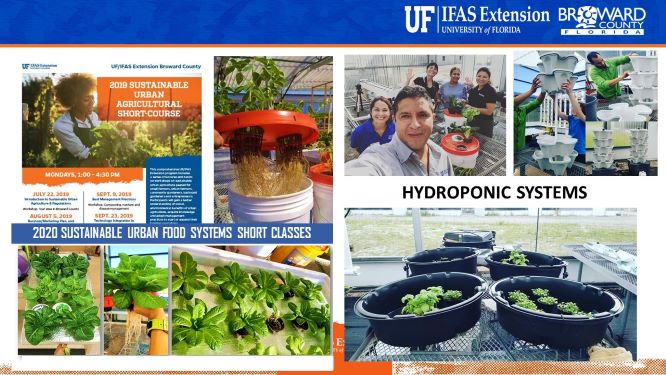
.JPG)
